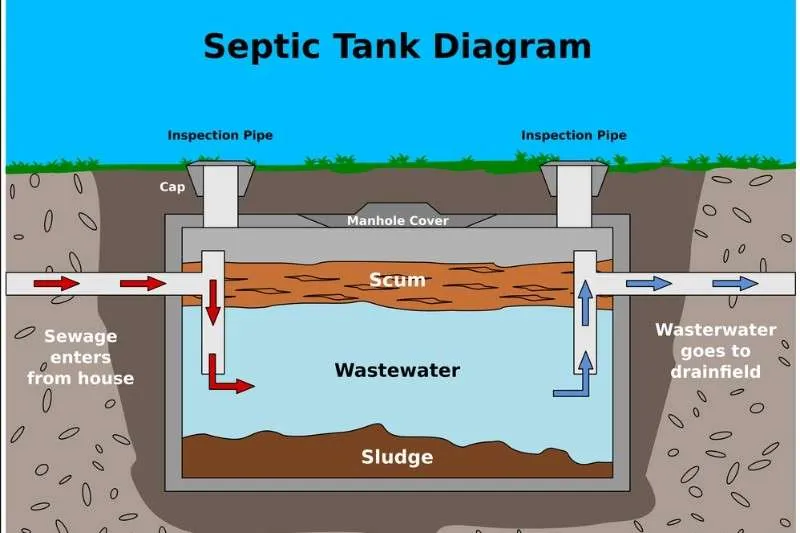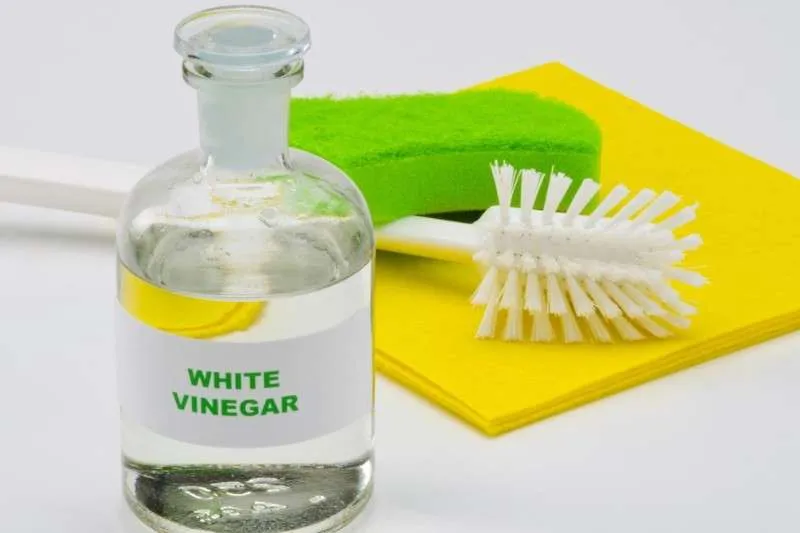Are you considering using vinegar to maintain your septic system but unsure if it’s safe or effective? It’s natural to feel overwhelmed by conflicting information on this controversial topic.
This blog post aims to break down every aspect of using vinegar in a septic system, from efficacy and safety considerations to long-term maintenance implications.
Please keep reading for a thoughtful exploration into whether vinegar can keep your septic system running smoothly without damaging its components!
Introduction to Septic Systems: Basic Overview and Functioning of Septic Systems.

Septic systems are an important part of any home’s plumbing system. They serve as a safe way to dispose of wastewater and prevent it from polluting local water sources.
A septic system consists of a tank, inlet pipe, outlet pipe, and drain field. The tank is the main component of the system; wastewater enters through an inlet pipe and settles within the tank, where solid materials separate from liquid before going out through an outlet pipe.
Finally, the remaining liquid flows into a drain field where bacteria break down solids for further treatment. Proper maintenance of septic systems is essential to keep them functioning properly and avoid damage to components or surrounding areas.
What is Vinegar: A Brief Introduction to the Product.
Vinegar is a liquid made from acetic acid and other ingredients. It has been used as a household cleaner for hundreds of years, but its use in septic systems is more recent. Vinegar has the potential to be effective at breaking down solids and fats that may not otherwise be broken down by bacteria alone.
It can also help prevent odors from forming in your system and reduce algae growth. However, it’s important to consider the safety and efficacy of vinegar before using it on your septic system.
Can Vinegar Be Used in Septic Systems? What Experts Say.

The debate about using vinegar in septic systems has been gaining traction over the years, and for good reasons. On the one hand, people are searching for affordable and natural cleaners to maintain their systems, while on the other, there is a lack of clarity around safety and efficacy considerations.
To help you make an informed decision, we’ve compiled expert opinions from plumbers and other industry professionals into this blog post.
According to most experts, when used correctly, vinegar can be used safely in a septic system. However, it should not be your first choice as a maintenance product due to its limited effectiveness.
When used alone or in small doses, vinegar will not do much more than mask unpleasant odors or clogs; it will not fully break down and dissolve solid materials.
Rather than relying solely on vinegar to keep your septic system in good condition, experts recommend combining vinegar with other natural septic-friendly products such as baking soda or hydrogen peroxide for long-term maintenance.
This combination can help maintain the balance of acidity and alkalinity in the tank, prevent blockages from forming, and reduce the buildup of sludge or scum.
Benefits of Using Natural Products in Septic Systems.
When it comes to maintaining a septic system, many homeowners turn to natural products such as vinegar for their cleaning and maintenance needs. But is this safe? Let’s explore the benefits of using natural products in septic systems.
Lower Risk of Contamination
Natural products, such as vinegar, are free from all harsh chemicals and can help reduce the risk of contamination when used correctly in your septic system.
Cost-Effective Cleaning Solution
Vinegar is generally very affordable compared to other costly chemical solutions, making it an incredibly cost-effective cleaning solution for your septic system.
Non-Toxic
The absence of harsh chemicals makes vinegar and other natural products a non-toxic way to clean your septic system.
Environmentally Friendly
Natural cleaning solutions are generally more eco-friendly than those containing chemical compounds, making them a great choice for septic systems and the environment.
Prevents Clogging and Blockages
Regular maintenance with natural products like vinegar can help prevent costly clogs or blockages in your pipes by dissolving organic matter buildup over time.
Reduces Odor
Natural products such as vinegar can effectively control odors associated with septic tanks without any additional harsh chemicals or fragrances.
Longer Septic System Lifespan
Natural products like vinegar can help extend your septic system’s lifespan when used with other proper maintenance techniques.
Chemical-Free Cleaning
Using natural cleaning solutions helps keep toxic chemicals out of your home and local environment, making it a much better option for those concerned about air and water quality.
Vinegar as a Cleaning Agent: Is It Effective for Septic Systems?
Septic systems are vital to any home, disposing of wastewater and preventing costly septic tank backups. Keeping these systems running efficiently is essential, but the harsh chemicals used in many commercial cleaning agents can damage their components.
As such, homeowners often turn to natural alternatives such as vinegar when looking for ways to clean their septic system safely. But is vinegar effective in keeping your septic system functioning properly? To answer this question, it’s important to understand what kind of role vinegar plays in the cleaning process.
Vinegar is an acid-base cleaner that breaks down oils and fats on contact. This makes it ideal for removing clogs caused by soap scum or grease buildup in your pipes. Its acidity also helps dissolve hard water deposits and mineral scales, improving wastewater flow through your system.
However, vinegar can’t do everything that a commercial cleaning agent does. It doesn’t contain any enzymes or good bacteria in the septic treatment needed for breaking down organic matter in the septic tank, and its acidity can’t penetrate deep enough into the tank’s walls to effectively clean out buildup from its interior surfaces.
As such, it’s best used as part of an overall maintenance plan rather than as a standalone solution for keeping your septic system functioning properly.
Other Natural Cleaning Products for Septic Systems.
Many homeowners prefer natural products to harsh chemicals when cleaning and maintaining a septic system. Other natural options for keeping septic systems running smoothly include baking soda, borax, and hydrogen peroxide.
Baking soda removes odors from the drain field and inside the tank. Borax can help prevent clogs by helping break down organic matter in the pipes. Hydrogen peroxide is an effective cleaner that helps reduce harmful bacteria in the system without introducing additional toxins like chlorine or bleach.
Best Practices for Maintaining Septic Systems: Tips for Keeping Your System Healthy.
- Regularly inspect your septic system components to ensure they are properly working. Signs of wear or damage should be addressed immediately, which can lead to costly repairs.
- Pump out your septic system at least once every three years – more often if you have a high water usage household or a large family. This will help keep solids from accumulating and causing blockages that could impair the functioning of your system.
- Avoid flushing non-degradable garbage disposal items like wipes, diapers, paper towels, feminine hygiene products, and other similar items down your toilet, as these can clog up the pipes leading to your septic tank. Proper disposal is key for maintaining a healthy system.
- Use environmentally friendly cleaning products that don’t contain harsh chemicals or abrasives to help keep your septic system safe and functioning.
- Invest in a quality sewage treatment system with effective decomposing bacteria, which will help break down organic matter and reduce the load on your septic tank.
- Consider using a low-acid vinegar solution (diluted to around 10%) as an alternate septic treatment option for safely maintaining your septic system. Vinegar helps maintain optimal pH levels in your system and keeps pipes clean without damaging components – make sure it is not used too frequently or in large amounts!
FAQs
Is white vinegar OK for septic tanks?
White vinegar is generally safe in septic tanks, as its mild acidity quickly turns into harmless compounds.
Can I clean my toilet with vinegar if I have a septic tank?
Yes, you can safely clean your toilet with white vinegar. However, avoid harsh chemical cleaners that could damage the septic system components and cause potential blockages.
Can you pour vinegar down the drain with a septic system?
Distilled white vinegar is safe to pour down the drain with a septic system. A few drops break down quickly into harmless components and help maintain an optimal pH level in septic tanks.
Is Dawn dish soap safe for septic systems?
Dawn dish soap is safe for septic systems and helps break down organic waste. However, avoid using too much and make sure not to pour dish soap down the drain when there’s standing water, as it may cause foaming and clogging.
How much vinegar do I put in my septic tank?
The amount of vinegar you should use in your septic tank depends on the size and condition of your system. Generally, a gallon of white vinegar diluted with 10 gallons of water is safe and effective to use regularly.
Is apple cider vinegar good for septic systems?
Apple cider vinegar is generally not recommended for septic tanks as it has a higher acidity level than white vinegar and could damage the components.
What is the safest dish soap for septic systems?
The safest dish soap for septic systems is a mild, biodegradable dish soap free of harsh chemicals. Dish soaps that contain enzymes are especially good at breaking down organic waste while also being gentle on septic tank components.
Conclusion
Vinegar can safely be used in septic systems as a cleaning aid if done responsibly. It’s important to note that vinegar should never be poured down the drain in large quantities—to keep your septic system safe, dilute white or apple cider vinegar with water and use it sparingly. As a natural cleaning agent, vinegar can be beneficial in a regular septic maintenance routine and provide limited protection against bacteria build-up. However, other natural products, such as baking soda, borax, and cinnamon, may also help protect and maintain your septic system. And finally, many best practices should be followed when it comes to maintaining a healthy septic system.


